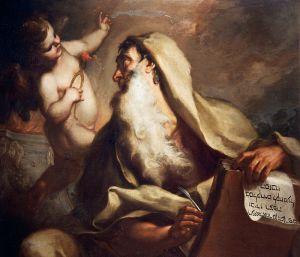Everyone wants to be remembered. While many don’t wish to be famous, we all hope that someone notices the noteworthy things we’ve done. By any measure Isaiah of Jerusalem seems to have succeeded. Every year around Christmastime his words, set to music, are sung in churches around the world. He gets regular readings among those who attend synagogue and even those who take secular Bible classes have to reckon with him. Isaiah even attracted imitators before his book was finally compiled. According to the Good Book he was a trusted advisor to King Hezekiah. But what do we know of him as a person? Biographical episodes in his book are rare, unlike those of his fellow major-leaguers Jeremiah and Ezekiel. Who was Isaiah?

It’s not Christmastime, so why am I writing about him now anyway? Well, a friend pointed me to a recent archaeological discovery from Jerusalem that is a broken seal impression (technically called a bulla) that may have originally read “Isaiah the prophet.” The news was broken in Biblical Archaeology Review, but it can be read about for free here. Eilat Mazar, the archaeologist publishing the inscription, notes that it reads “Yesha‘yah[u] nvy…” As often happens in archaeology, the end of the inscription is missing. In case your Hebrew’s even rustier than mine Yeshayah sounds a lot like Isaiah—go ahead, sound it out. The word prophet is nvy’. Don’t let that apostrophe fool you; it’s a full-fledged consonant in Hebrew. If that final letter has been reconstructed correctly the seal would read “Isaiah the prophet.”
My friend asked me what I though of this. My initial impression is that it would be odd for anyone to sign themselves with the title “the prophet.” If they did it would require a bit more hubris than I mentally attribute to Isaiah. You see, a prophet was selected, so they believed, by God. Chosen even among the chosen people. It wasn’t a pleasant job—once again, Jeremiah’s jeremiads come to mind. Would someone have signed himself “the prophet”? We don’t have a terrible lot of information from the ancient world about individuals. What we do know is subject to exaggeration and other forms of hyperbole. Did Isaiah, mouthpiece of Yahweh, carry an official seal declaring that the contents were bona fide possessions of a man who saw God sitting on his throne and survived to tell the tale? Or is it a hopeful reading of those who want to demonstrate the Bible is true? It’s a question the reader must decide, for, as always seems to happen, the evidence is broken just at the crucial point.
